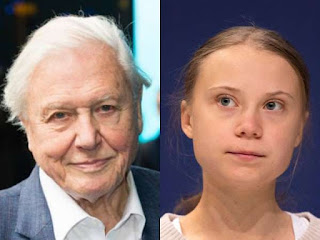 |
| David Attenborough and Greta Thunberg |
While the biggest changes must
come from governments and corporations (Coco-cola
and Nestle are the worst culprits), we can all still do our bit and an important
weapon against this is education. Since the 1980s, fossil fuel companies such
as ExxonMobil have fuelled climate change denial which has a big impact on our
ability to move green proposals forward. Therefore, it’s critical that we brush
up on our climate facts and help our loved ones make positive steps to a
cleaner future. The BBC are releasing a new campaign titled ‘Our Planet Matters’
where, for the next year, special programmes will be shown to help educate the
nation on this issue.
So what can you do? Becoming ‘eco-friendly’ is a trend that’s gaining popularity on social media platforms and, though this promises a greener mentality within society, we must be wary of companies trying to cash in on our planet.
 |
| Use reusable straws instead of plastic. |
We can see for ourselves the impact of Climate Change. Sea levels are rising, our weather is becoming more extreme and mass extinctions are currently taking place. At the end of the day, we must decide what we want for this planet and make active steps towards a better future. It’s not too late. Yet.
 |
| UN: 'Yes, Climate Change is Driving Wild Fires.' |

David Attenborough is incredible though. Great ending to the blog post too! Direct address was very convincing and I now feel strangely motivated.
ReplyDelete